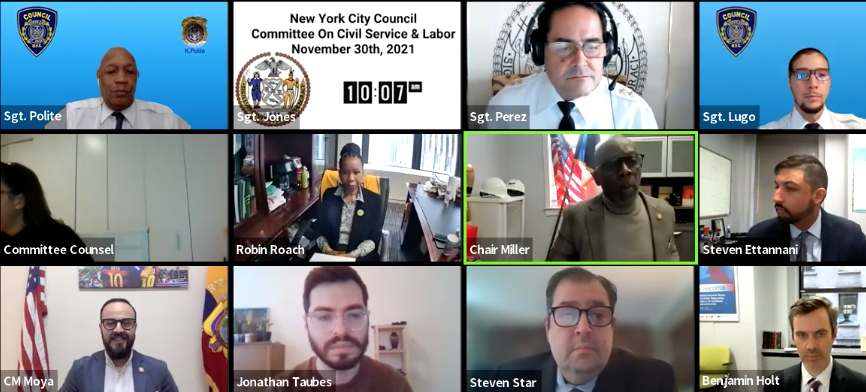Council considers amendment to collective bargaining law
/City Councilmember I. Daneek Miller held a committee hearing on his bill to update collective bargaining law in the city’s administrative code. Screenshot via City Council Livestream
By Rachel Vick
The City Council Committee on Civil Service and Labor met Tuesday to discuss a bill proposed by Councilmember I. Daneek Miller to amend the city code to reflect changes in collective bargaining precedent.
Miller said the amendment would “reduce unions’ obligations and financial strain ultimately preserving the viability of the unions.”
“There's a lot to agree to disagree about but this is not one of them,” Miller, who previously served as president of the Amalgamated Transit Union (ATU) Local 1056, said. “A strong, organized workforce is to the benefit of the city.”
Under the bill, co-sponsored by Kalman Yager, unions would no longer be required to bear the costs of legal action taken under collective bargaining agreements by non-union members if union leadership declined to participate.
The individual would be responsible for the costs incurred and have the option to file a duty of fair representation case against the union — which has a responsibility to protect contract-negotiated interests — if they oppose the proposed proceeding, according to Deputy Chair General Counsel at The Office of Collective Bargaining Steven Star.
The bill would update city regulation to reflect the 2018 U.S. Supreme Court ruling in Janus v. American Federation of State, County, and Municipal Employees, where the justices ruled 5 to 4 that the practice of collecting agency fees from nonconsenting public-sector employees violated the First Amendment.
“It has long been recognized that the right to collective bargaining is essential to sound and stable labor relations which benefits the city, its employees and the public,” Star said, explaining the OCB perspective that placing the financial responsibility back on non-union members after two years of representation without the ability to offset the costs would benefit unions’ overall operations.
The first steps taken before a disagreement can usually be taken without union supervision – the arbitration stage is overseen by the union in order to protect their interests and those of their members, said Robin Roach, general counsel for DC 37.
Roach said that the DC 37 has a “robust” process to determine whether a grievance has enough merit to bring up arbitration — a process she hopes demonstrates the value of union representation and encourages eligible employees to become due paying members.
“Every bad decision takes away from the meaning of the language in the contract and every good decision heightens or straightens the language in the contract, so that's where we believe in the exclusivity of the union and our ability to determine whether a matter should proceed,” Roach said. “We don’t believe this provision requires us to give up exclusivity.”
“Our force at the bargaining table has not diminished [despite COVID cutbacks],” she added. “We’re still speaking on behalf of [thousands of] workers and people that, if we are able to garner the benefits, we can demonstrate to them the benefits of being in the union.”
If passed and signed by the mayor, the bill would go into effect 30 days after becoming law.




